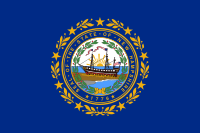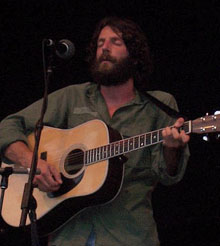Portal:New Hampshire
The New Hampshire Portal New Hampshire (/ˈhæmpʃər/ HAMP-shər) is a state in the New England region of the Northeastern United States. It borders Massachusetts to the south, Vermont to the west, Maine and the Gulf of Maine to the east, and the Canadian province of Quebec to the north. Of the 50 U.S. states, New Hampshire is the fifth smallest by area and the tenth least populous, with a population of 1,377,529 residents as of the 2020 census. Concord is the state capital and Manchester is the most populous city. New Hampshire's motto, "Live Free or Die", reflects its role in the American Revolutionary War; its nickname, "The Granite State", refers to its extensive granite formations and quarries. It is well known nationwide for holding the first primary (after the Iowa caucus) in the U.S. presidential election cycle, and for its resulting influence on American electoral politics. New Hampshire was inhabited for thousands of years by Algonquian-speaking peoples such as the Abenaki. Europeans arrived in the early 17th century, with the English establishing some of the earliest non-indigenous settlements. The Province of New Hampshire was established in 1629, named after the English county of Hampshire. Following mounting tensions between the British colonies and the crown during the 1760s, New Hampshire saw one of the earliest overt acts of rebellion, with the seizing of Fort William and Mary from the British in 1774. In January 1776, it became the first of the British North American colonies to establish an independent government and state constitution; six months later, it signed the United States Declaration of Independence and contributed troops, ships, and supplies in the war against Britain. In June 1788, it was the ninth state to ratify the U.S. Constitution, bringing that document into effect. Through the mid-19th century, New Hampshire was an active center of abolitionism, and fielded close to 32,000 Union soldiers during the U.S. Civil War. After the war, the state saw rapid industrialization and population growth, becoming a center of textile manufacturing, shoemaking, and papermaking; the Amoskeag Manufacturing Company in Manchester was at one time the largest cotton textile plant in the world. The Merrimack and Connecticut rivers were lined with industrial mills, most of which employed workers from Canada and Europe; French Canadians formed the most significant influx of immigrants, and today roughly a quarter of all New Hampshire residents have French American ancestry, second only to Maine. Reflecting a nationwide trend, New Hampshire's industrial sector declined after World War II. Since 1950, its economy diversified to include financial and professional services, real estate, education, transportation and high-tech, with manufacturing still higher than the national average. Beginning in the 1950s, its population surged as major highways connected it to Greater Boston and led to more commuter towns. New Hampshire is among the wealthiest and most-educated states. It is one of nine states without an income tax and has no taxes on sales, capital gains, or inheritance while relying heavily on local property taxes to fund education; consequently, its state tax burden is among the lowest in the country. It ranks among the top ten states in metrics such as governance, healthcare, socioeconomic opportunity, and fiscal stability. New Hampshire is one of the least religious states and known for its libertarian-leaning political culture; it was until recently a swing state in presidential elections. (Full article...) Entries here consist of Good and Featured articles, which meet a core set of high editorial standards.
Mariano Gagnon OFM (born Joseph Theodore Gagnon; October 7, 1929 – April 28, 2017) was an American Franciscan friar and Catholic priest, who served as a missionary in Peru. Gagnon founded the Cutivereni mission in Peru's Ene River valley to assist the indigenous Asháninka people who were being forced out of their homes in the jungle by settlers. He would later become known for his work helping arm the Asháninka and eventually helping some Asháninka flee Cutivereni when it was facing attack from Shining Path guerrillas during the internal conflict in Peru. He later wrote about his experiences during the conflict in the book Warriors in Eden. (Full article...) Selected article -
Raymond Charles Jack LaMontagne (/ˌlɑːmɒnˈteɪn/; born June 18, 1973) is an American singer-songwriter and musician. LaMontagne has released eight studio albums: Trouble, Till the Sun Turns Black, Gossip in the Grain, God Willin' & the Creek Don't Rise, Supernova, Ouroboros, Part of the Light, and Monovision. He was born in New Hampshire and was inspired to create music after hearing an album by Stephen Stills. Critics have compared LaMontagne's music to that of Otis Redding, Ryan Adams, Beck, Pink Floyd, The Band, Van Morrison, Nick Drake and Tim Buckley. (Full article...) General images -The following are images from various New Hampshire-related articles on Wikipedia.
Did you know -
TopicsCategoriesNew articlesThis list was generated from these rules. Questions and feedback are always welcome! The search is being run daily with the most recent ~14 days of results. Note: Some articles may not be relevant to this project.
Rules | Match log | Results page (for watching) | Last updated: 2024-05-08 21:23 (UTC) Note: The list display can now be customized by each user. See List display personalization for details.
Related portalsWikiProjectsAssociated WikimediaThe following Wikimedia Foundation sister projects provide more on this subject:
Sources |




































